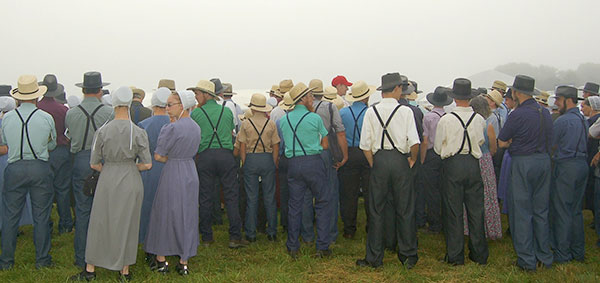The Catholic Reformation for radicals
No hard words should be used nor any sort of contempt for their errors be shown—Ignatius Loyola

“Great care must be taken to show forth orthodox truth in such a way that if any heretics happen to be present they may have an example of charity and Christian moderation. No hard words should be used nor any sort of contempt for their errors be shown. ”—Ignatius of Loyola.
Reflections by Stephen Kriss, executive minister of Franconia Mennonite Conference
I grew up in a town in Western Pennsylvania known as a place of churches and bars. This was true for many mining and mill towns where influxes of immigrants from Southern and Eastern Europe helped to fuel the rise of an American superpower through hard labor in the early twentieth-Century. There were churches for nearly every language group . . . Hungarian Reformed, Russian Orthodox, Italian Catholic, and German Baptist (Church of the Brethren) just to name a few.

An Amish gathering, representative of one branch of the Anabaptists.
I was one of the heretics. I hadn’t been baptized as an infant. I was among the non-Catholic minority in the community, which was most noticeable on school days when students were released for weekly Catholic catechism classes. I was among those left behind to fend for ourselves while everyone else was off preparing for first Holy Communion and confirmation. We non-Catholic “left behinders” were quite an assorted crew: Methodist, Brethren, Lutheran, Presbyterian, Baptist, Orthodox, Jehovah’s Witness, Mormon, and irreligious. We only occasionally talked about faith, but I recall conversations about dates for Orthodox Christian holidays (which we also had off from school due to the noticeable presence of the Orthodox), and my JW friends lamented that they didn’t celebrate anything, other than a little bit of Christmas on the sly.
I have grown up with a sense of what it means to be a minority surrounded by plurality. My mom’s workplace was closed for Jewish holidays. The women from the church a few doors up the street always dressed in Amish-style plain dresses. There’s now a mosque down the street from where I grew up, while the Lutheran church has been consolidated and is now a funeral parlor. During my summer holidays, a friend and I would slip to his house to eat his family’s homemade Syrian food. My grandpa, who lived with us, spoke Slovak and bits of German, Polish, and Slovene along with English.
However, with all of this diversity, I’ve always had a sense of living within a shadow of Roman Catholicism, finding both a sense of the holy and the transcendent, as well as annoyance and alienation.
With the rise of Pope Francis, I’ve begun to become more aware of Ignatius of Loyola and his movement, the Jesuits, to which Francis belongs. I’m fascinated with the voracity of Ignatius’ commitments and the energy he committed to the Catholic Reformation. While others were pointing out wrongs and misgivings, Ignatius was intent on reforming the church through action and engagement with the world. Through his mission-driven movement, the Jesuits were among the first to take the message of the Gospel to the Western Hemisphere. The intention of his movement is mission and education; to display a life lived in truth; to both embody and teach it.
Having been shaped in such a community of religious and ethnic diversity, with a marginal minority viewpoint, I have become accustomed to a “different way.” I’ve learned to speak openly without assumptions, aiming toward kindness and invitation on my best days. I’ve come to understand that orthodox truth is a thing that I long to seek and model, but that I always see it “through a glass darkly.” While this requires healthy humility, Ignatius’ invitation is to anything but a sense of timidity. His call, his passionate plea, was to offer a vivacious example of both Christian love and restraint in the midst of differences. He calls us to “charity and Christian moderation,” with “no hard words . . . for their errors.” His invitation here is to have no sense of contempt, which is itself countercultural in our age of the Twitter-based call out and clap-back.
I’m challenged as a leader in a centuries-old Anabaptist community to live into the Ignatian way that is both reflective and passionate, that proclaims truth while anticipating plurality and diversity of understanding. I know that our historic movements are transformed by engagements with neighbors nearby and faraway, when we passionately pursue truth as Ignatius invites.
In the example of Ignatius’ mission driven reforming, there are possibilities for ongoing reformation that are responsive yet faithful. Instead of being overwhelmed by the changes around us, I hear clearly again the divine call to live in the Way, the Truth and the Life with humility, intensity and hope.
Stephen Kriss is executive minister of Franconia Mennonite Conference and a professor with Eastern Mennonite University at Lancaster.
(Join us each Thursday for a fresh look at a quote from the Reformation era! Sign up via our e-newsletter (in the box at the right) or through our RSS feed (above), or follow us on Facebook through October as we celebrate 500 years of Reformation.) For more on Catholic reformers, check out Christian History magazine #123 on the Catholic Reformation, specifically this article on Ignatius and the founding of the Jesuits.



